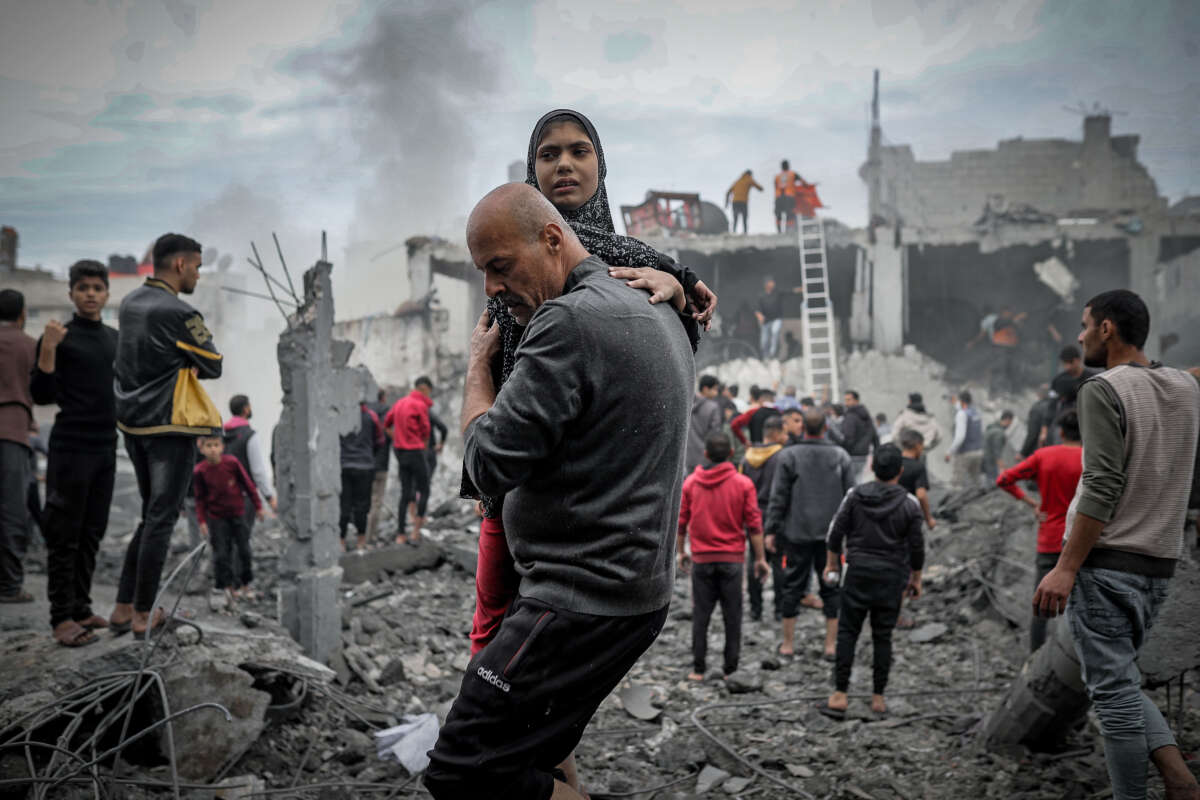Did you know that Truthout is a nonprofit and independently funded by readers like you? If you value what we do, please support our work with a donation.
The leaders of six humanitarian groups have issued an urgent call for U.S. leaders to demand a ceasefire in Gaza, saying that the conditions that Palestinians are suffering through are the worst they’ve seen in their time doing global humanitarian aid.
In a New York Times op-ed on Monday, the humanitarian group leaders wrote that, though they have responded to crises across the world, Israel’s blockade, invasion and assault of Gaza has created a “humanitarian nightmare” that aid groups are powerless to alleviate.
“We were there when fighting erupted in Khartoum, Sudan. As bombs rained down on Ukraine. When earthquakes leveled southern Turkey and northern Syria. As the Horn of Africa faced its worst drought in years. The list goes on,” they wrote. “But as the leaders of some of the world’s largest global humanitarian organizations, we have seen nothing like the siege of Gaza.”
The op-ed was written by CARE USA President Michelle Nunn; Mercy Corps CEO Tjada D’Oyen McKenna; Norwegian Refugee Council Secretary General Jan Egeland; Oxfam America President Abby Maxman; Refugees International President Jeremy Konyndyk; and Save the Children U.S. President Janti Soeripto. The article echoes one written by Oxfam GB CEO Dhananjayan Sriskandarajah in October, who also said that it was the worst crisis Oxfam has ever seen.
“In no other war we can think of in this century have civilians been so trapped, without any avenue or option to escape to save themselves and their children,” the group leaders wrote.
They went on to say that, while the October 7 attack by Hamas forces was “depraved,” it does not justify the subsequent assault that has now killed over 18,000 Palestinians and injured nearly 50,000 more. Because the U.S. bears strong culpability for the massacre, the group leaders said that world leaders like President Joe Biden must call for an immediate ceasefire in order to save as many lives as possible.
The effects of Israel’s blockade of food, water, electricity, medical supplies and humanitarian aid have led to increasingly desperate conditions, they noted: Hospitals are being forced to perform operations without anesthesia, and are using dishcloths as bandages. The little aid that has been allowed to enter the region can’t be distributed properly because aid workers are at risk of being killed just by distributing supplies. One worker said that they recently had to feed an orphaned baby with powdered milk — the closest thing they could find to baby formula — so that she wouldn’t starve.
“Secretary of State Antony Blinken once said of the war in Ukraine that the targeting of heat, water and electricity was a ‘brutalization of Ukraine’s people’ and ‘barbaric.’ The Biden administration should acknowledge that the same holds true in Gaza,” the groups’ leaders wrote. “While it has announced measures to deter violence against Palestinian civilians in the West Bank, Mr. Blinken and his colleagues should apply similar pressure to stop violence against civilians in Gaza, too.”
While governments and political figures have largely refused to condemn Israel’s slaughter of Palestinians, aid groups that have been responding to the crisis have been strong in their opposition — with many global groups denouncing the U.S. in particular for its complicity.
On Friday, the U.S. was the only country in the 13-member UN Security Council to vote against a resolution demanding a ceasefire in Gaza and an immediate release of all hostages, sinking the vote with the U.S.’s veto power. In response to the vote, groups like Human Rights Watch and Doctors Without Borders USA called out the U.S. as being singular in its backing of the siege.
Meanwhile, there are countless stories emerging each day of the horrors Israel is inflicting on Palestinians in Gaza, including appalling reports of Israeli forces sniping civilians and health care workers and beating and torturing children they have detained. Survivors of the 1948 Nakba have reported reliving their trauma over and over as Israel expels millions of Palestinians from their homes or the refugee camps they’ve been forced into.
A terrifying moment. We appeal for your support.
In the last weeks, we have witnessed an authoritarian assault on communities in Minnesota and across the nation.
The need for truthful, grassroots reporting is urgent at this cataclysmic historical moment. Yet, Trump-aligned billionaires and other allies have taken over many legacy media outlets — the culmination of a decades-long campaign to place control of the narrative into the hands of the political right.
We refuse to let Trump’s blatant propaganda machine go unchecked. Untethered to corporate ownership or advertisers, Truthout remains fearless in our reporting and our determination to use journalism as a tool for justice.
But we need your help just to fund our basic expenses. Over 80 percent of Truthout’s funding comes from small individual donations from our community of readers, and over a third of our total budget is supported by recurring monthly donors.
Truthout has launched a fundraiser to add 379 new monthly donors in the next 6 days. Whether you can make a small monthly donation or a larger one-time gift, Truthout only works with your support.
